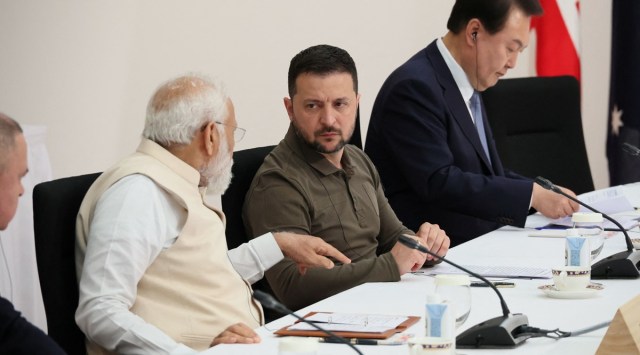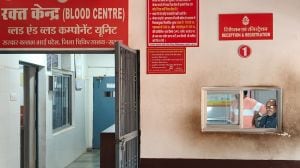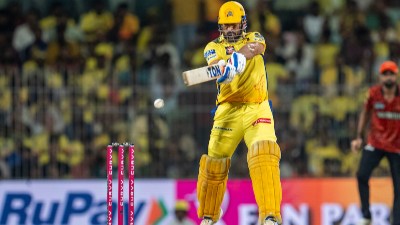The remarks came during a session “Toward a Peaceful, Stable and Prosperous World” at the G7 summit in Hiroshima, and came a day after the Indian Prime Minister had told Ukraine President Volodymyr Zelenskyy that New Delhi will do “whatever is possible” to find a solution to the conflict.

Modi’s statement on Sunday referenced his meeting with the Ukrainian President the previous day: “We heard President Zelenskyy today. I also met him yesterday. I do not consider the current situation as an issue of politics or economy. I believe that this is a matter of humanity, a matter of human values. From the very beginning, we have maintained that dialogue and diplomacy is the only way. And we will make every possible effort to contribute, in whatever way India can, for resolving this situation.”
He flagged the impact of the war on food and energy security and ineffectiveness of the UN. “It is necessary that all countries respect the UN charter, international law and sovereignty and territorial integrity of all countries. Raise your voice together against unilateral attempts to change the status quo. India has always been of the opinion that any tension, any dispute should be resolved through peaceful means, through dialogue. And if there is a solution from the law, then it should be accepted. And it was in this spirit that India resolved its land and maritime boundary dispute with Bangladesh.”
While Delhi had earlier called for respect for “the UN charter and sovereignty and territorial integrity of countries”, this is the first time that the Indian PM has called for raising voice together against unilateral attempts to change the status quo — in the context of the Russian invasion of Ukraine.
The G7 has been dominated by Zelenskyy’s presence and that has been the highlight of the joint communique as well.
Modi said, “Global peace, stability, and prosperity is our common objective. In today’s inter-connected world, crises in any one region affect all the countries. And, the developing countries, which have limited resources, are the worst affected. In the current global situation, these countries are facing the maximum and most profound impact of the food, fuel, and fertilizer crisis.”
Story continues below this ad
“It raises the question as to why we are facing the need to discuss matters of peace and stability in distinct forums. The United Nations (UN), which was established with the very purpose of establishing peace, why does it often fail to prevent conflicts today? Why, even the definition of terrorism has not been accepted in the UN yet? If introspection is done, then one thing is clear. The institutions created in the last century are not in line with the system of the twenty-first century. They do not reflect the realities of the present. That is why it is necessary that reforms should be given concrete shape in big institutions like the UN. It will also have to become the voice of the Global South. Otherwise, we will just keep talking about ending conflict. (The) UN and Security Council will become just a talk shop.”
ExplainedSignal to Moscow & Beijing
AFTER Modi and Zelenskyy’s first in-person meeting since the invasion in February last year, the inclusion of the sentence “raise your voice against unilateral attempts to change the status quo” is being perceived as a signal to Moscow. But New Delhi will want to read this as a message to Beijing. For the G7 and Ukraine, India’s shift in language will be seen as significant and cited like Modi’s statement that “this is not an era of war”.
Citing Buddha’s influence and teachings, he said, “In India, and here in Japan too, Lord Buddha has been followed for thousands of years. There is no such problem in the modern age whose solution we cannot find in the teachings of the Buddha. Buddha had given the solution centuries ago to the war, unrest, and instability that the world is facing today. Lord Buddha has said: Enmity does not calm enmity. Enmity is pacified by affinity.”
“It is in this spirit, we should move forward together with everyone,” he said.
India has so far sought to maintain a diplomatic balancing act between Russia and Ukraine. While India has not explicitly condemned the Russian invasion, it has called for an international probe into the Bucha massacre and expressed concern over nuclear threats issued by Russian leaders. At the UN Security Council, India has taken a nuanced position and abstained from voting against Russia in several resolutions.
Story continues below this ad
While Modi and Zelenskyy have spoken to each other four times since February last when Russia invaded Ukraine, this was their first in-person meeting since November 2021 on the sidelines of the COP-26 at Glasgow. In the conversations since last December, Zelenskyy has sought India’s support for his 10-point “peace formula”, which calls for withdrawal of Russian troops from Ukraine, release of prisoners, restoration of Ukraine’s territorial integrity, and guarantees on nuclear safety, food and energy security.
Modi has spoken to Putin at least five times in the last 15 months, and they had met on the sidelines of the SCO Summit on September 16 last year in Samarkand, Uzbekistan. At that time, Modi had told Putin that this is “not an era of war” – this was reflected in the recent Bali Declaration of the G20 as well.
Putin has been invited to India for the Shanghai Cooperation Organisation summit in July and the G20 summit in September this year.









